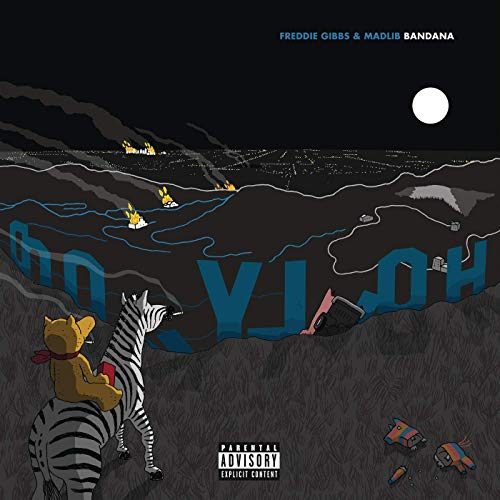Five years ago, underground hip-hop artist Freddie Gibbs teamed up with the prolific beatmaker known as Madlib for “Pinata“, a Blaxploitation-era coke dealing film on wax. Of course, both men had been on their grind in the music business for years and are very esteemed in their own respective rights. However, the build-up leading to “Pinata” (which started in 2011 with 3 acclaimed collaborative EP’s) was akin to the Marvel Cinematic Universe’s escalation into 2012’s “Marvel’s The Avengers”. In short, they knocked it out of the park with “Pinata“. Part of Madlib’s production style is constantly digging for samples, unorthodox ones at that, and then being able to reconfigure them into hip-hop grooves. With Gangsta Gibbs (or “Gangsta Kane” as he’s been referring to himself on their most recent album), his talent lies in his Scorsese-like eye for detailed crime narratives and the experience to back up his brash gumption. While “Pinata” was highly lauded, listeners were fiending for more. Maybe they didn’t want a direct sequel, though, but rather a new effort between them. After several listens, I’ve concluded that their latest album, “Bandana“, is making its stand in both of those worlds. A standing that, while high in stature, doesn’t reach the heights of its predecessor.
Gibbs’ past as a dope dealer in his hometown of Gary, Indiana is the main source of his lyrical material. Most of the songs on “Bandana” are coke rhymes showing how facets of Gibbs’ personality reflect on the lifestyle of the drug dealer, detailing the greed, money, carnal appetites, the willingness to get one’s hands dirty, and the negative consequences as well. While the lyrical content remains mostly resilient, the production is noticeably different. I won’t delve into how the album was mixed or that the beats were allegedly created on an iMac, I’ll leave that discussion to producers and other audiophiles. What I’m referring to is Madlib’s choice of samples. Unlike the 2014 effort, the musical backdrop on “Bandana” doesn’t have soul samples completely backing it. There are rock guitar samples, along with Madlib’s customary movie and spoken dialogue samples incorporated as well. Additionally, Gibbs makes several NBA basketball references and the album contains less guest rappers than on the previous effort, but no less in their lyrical potency (perhaps more).
Delving into the songs, one thing I picked up on in the first listen was how the album is mired in dichotomy. This is reflected in how Madlib switches up the beat at the halfway mark on several songs and it’s even seen in the song titles. Take “Half Manne Half Cocaine”, for example. Lyrically, the song serves as Gibbs’ first-hand accounts of both sides of himself regarding his role as a dealer: The part of him that enjoys the fruits of his labor (women, sex, and money) and his part in the distasteful deeds comprising said labor. It’s sort of reminiscent of “Nosetalgia” by Pusha T. “Crime Pays” is the third single released from the album. While it isn’t compelling like the previously released singles (including a title track which actually didn’t make its way onto the album’s tracklist), it’s noteworthy for Madlib’s airy production and the accompanying video which has the side effect of showcasing Gibbs’s gift for comedy:
The guest artists were shortened down to five for “Bandana“, but that’s fine because each emcee brings their A-game. “Palmolive” is the first star-studded track on the album and features Killer Mike and Pusha T. With King Push and Freddie Gibbs on the same track, you’d think they’d cancel each other out given their status as two of hip-hop’s most preeminent coke rhymers. But here, despite Gibbs and Mike holding their own, it’s Pusha who comes out on top this time. In contrast, the song “Education” features Yasiin Bey and Black Thought. While there is a learning theme to all three emcees’ verses, there’s no clear winner on this track. With their flows and rhyme schemes over Madlib’s beat, everyone came correct. Anderson .Paak makes an appearance on “Giannis” and his trademark raspy laid-back Cali flow works over the production. The album’s first single, “Flat Tummy Tea”, not only has the hardest production on the album, but also represents my earlier assessments of the album’s dichotomy and deviation from soul samples: There are electric guitar-driven samples, hard drums, and a beat switch-up halfway through:
“Practice” is a good example of Freddie’s storytelling capabilities, telling a story about infidelity over a soulful backdrop. What’s interesting is how Gibbs applies infidelity to romantic, drug dealing, and music relationships and ties it all together at the end. Other tracks are notable for either the emcee or the producer, however: On “Gat Down”, the production goes hard as a rock courtesy of some very banging snares by Madlib. On “Cataracts”, Gibbs’ rapid-fire flow is in full-force and steals the show from the beat. Overall “Bandana” is certainly a solid album. It was one of 2019’s most anticipated releases and, while it’s not as good as “Pinata”, it’s still a worthy inclusion in any hip-hop fan’s collection.

